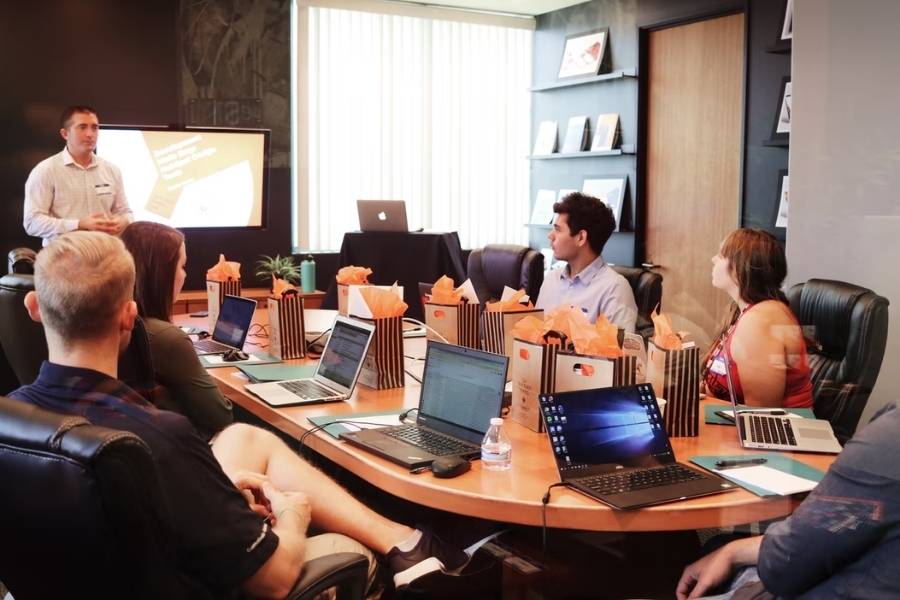There is no best time to apply, except for as soon as possible. Most UK graduate jobs begin the September after graduation. The top employers begin their application process up to a year before the start date. In order to not miss out on the big companies, start applying as soon as you know what you want to do.
A key time in the application process is the summer before your final year. Start thinking about which career is right for you. Research the skills and qualifications that are desirable for said career. Take into consideration the job's location and begin planning where you might live should you be successful. The period between September and January is important in terms of submitting your applications. The long process of interviews and assessments normally begin after February.
Many graduate schemes are seasonal in terms of application, meaning there is a set period to apply. If you miss the deadline you'll have to wait another year. Some schemes follow a rolling recruitment process, dispelling the myth that once the September – January window is closed you cannot apply, as roles are constantly added throughout the year.

Myth vs Fact
“I’ve missed my chance; all the deadlines have passed in January”
- Although 24% of The Times’ list of top 100 graduate employers have a deadline between October to January, 71% work on a rolling recruitment process. Many have separate deadlines for different jobs and 5% have a deadline between February and July. Clearly, there is plenty of time to bag your dream job. However, if you're unsuccessful when applying to your favourite job, you may have to wait until the following year before you can re-apply.
“If I don't get a graduate job straight after uni – I’ve missed my chance”
- Wrong. There is no limit on when you can apply, especially with rolling recruitment. However, it is more likely you'll be successful within your first three years of finishing university. Nonetheless, new graduate jobs are created every day and the industry is always changing and expanding, so don’t be discouraged from applying whenever you want.
“Graduate schemes need experience and I don’t have any – this means I cannot apply yet”
- Whilst it will help your application to have experience or contacts within your chosen sector, it is not necessary. It will, however, help you stand out to employers. Leaving more time between graduation and starting a graduate scheme will defect certain employers who want to be able to mould an ideal employee. A perfect way to gain experience is through internships, volunteer work and work experience, but they are not a necessity.
“I can’t apply if my degree isn’t exact to the job role.”
- It is not necessary to have studied a specific degree to get placed on a graduate scheme, even in the case of companies such as the so called ‘Big Four’ (Deloitte, KPMG, PwC and EY). Most companies are looking for candidates with the ability and drive to succeed. To many employers, having a degree in itself shows that you are able to learn, meet deadlines and are committed. As you will be trained in the role, you can apply for graduate schemes that are not directly linked to your field of study.
The Times Top 10 Employers
Of The Times’ list of top 100 employers, the top twenty are the most competitive and have closer deadlines. However, 55% have a rolling recruitment process through the year, meaning they will accept applications at any time or until the role has been filled. 25% have roles with separate deadlines depending on the job role. These typically use the October to July band of application, but can be more flexible depending on what you’re applying for. Only 20% have a set deadline in the October to January bracket.
| Rank | Employer | Industry or Business Sector | Starting Salary | Application Deadlines |
| 1 | PwC | Accounting & professional services | Competitive | Varies by function |
| 2 | Aldi | Retail | £42,000 | Rolling recruitment |
| 3 | Teach First | Public sector | Competitive | Rolling recruitment |
| 4 | Civil Service | Public sector | £25,000-£27,000 | November |
| 5 | IT & telecommunications | Competitive | Rolling recruitment | |
| 6 | KPMG | Accounting & professional services | Competitive | Rolling recruitment |
| 7 | Deloitte | Accounting & professional services | Competitive | Rolling recruitment |
| 8 | NHS | Public sector | £22,896 | December |
| 9 | EY | Accounting & professional services | Competitive | Rolling recruitment |
| 10 | BBC | Media | £22,000+ | Varies by function |
| 11 | Unilever | Consumer Goods | £30,000+ | Rolling recruitment |
| 12 | J.P. Morgan | Investment banking & fund management | Competitive | November |
| 13 | GSK | Chemicals & Pharmaceuticals | Competitive | Rolling recruitment |
| 14 | Lidl | Retail | £36,000-£44,000 | Varies by function |
| 15 | Goldman Sachs | Investment banking & fund management | Competitive | Rolling recruitment |
| 16 | HSBC | Banking & Finance | Competitive | Varies by function |
| 17 | Accenture | Consulting | Competitive | Rolling recruitment |
| 18 | John Lewis Partnership | Retail | Dependent on scheme | Rolling recruitment |
| 19 | Jaguar Land Rover | Engineering & Industrial | £29,000 | December |
| 20 | Barclays | Banking & Finance | Competitive | Varies by function |

Timeline of Events
Below is a guide as to when researching, deciding and applying would be beneficial. This is only a suggestion as to when applications should be completed and what to expect from potential employers.
| Month | What to do |
| July before your final year | Begin researching your future and what roles would suit you and what you want to do |
| August | Now you have your graduate schemes prepared and start thinking about your application, find out how to apply, what is needed and keep your details and CV up to date |
| September | Applications open. Although it is tempting to apply right away, talk to your careers advisors and have your applications check thoroughly |
| October - January | Attend careers fairs, talk to employers. Send your applications, send as many as possible to have the best chance at success. |
| February | Most deadlines have passed, graduate schemes will now filter through the applicants and choose their favourites |
| March - April | Assessments will be sent to you if you have succeeded in the first round. This will lead onto interviews and offers |
| May - June | There is a possibility of early deadlined schemes being re-opened if more jobs are available or they have not found the right person, so don't despair if you did not hear from your favourite earlier on |
| July | You will be reviewed on your applications and either given the job or not, don't give up if you haven't there are still applications to be made |
| August - September | If successful, you will begin your graduate scheme. If not, begin applications again. |
To conclude…
- You can apply anytime of the year – but apply early for top brands and businesses as they go quickly
- You do not have to do a graduate scheme straight out of university – it would help as it’s a great way to start a career
- Manage your time well – you don’t want to be stressing about your final year whilst trying to get a future career plan sorted, take your time and do what is best for you



